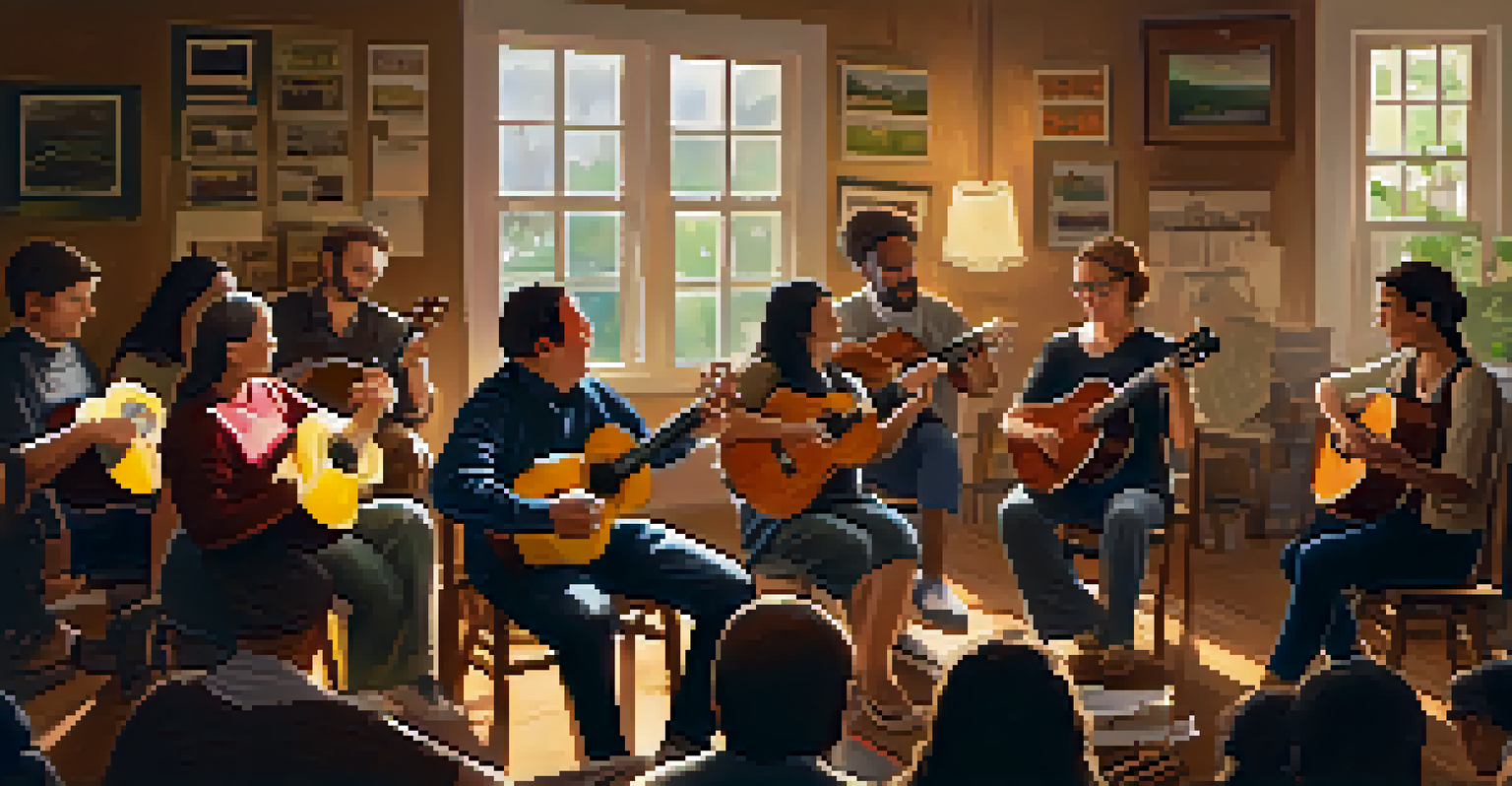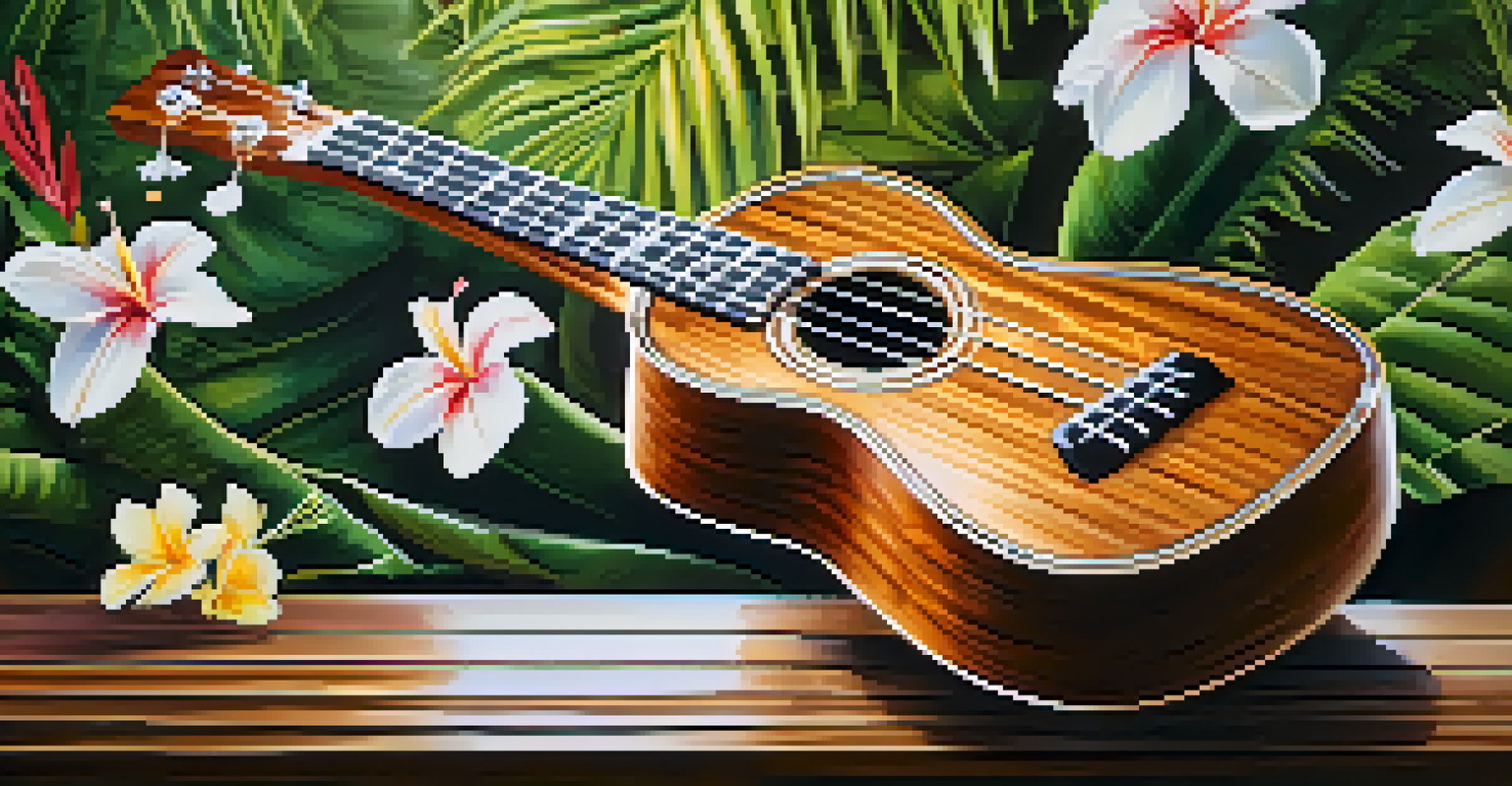The Ukulele's Influence on Pop Music Across Cultures

The Ukulele's Origins and Cultural Significance
The ukulele, originating from Hawaii in the 19th century, was inspired by Portuguese instruments. Its cheerful sound and approachable design quickly made it a beloved instrument across the islands. As it gained popularity, the ukulele became a symbol of Hawaiian culture, often featured in traditional music and dances.
The ukulele is the instrument of the people, a beacon of joy and simplicity in a complex world.
Its cultural significance extends beyond Hawaii, as the ukulele began to travel internationally with sailors and tourists. This instrument became a bridge for cultures, allowing different musical styles to blend and evolve. As it moved to the mainland U.S. and beyond, it adopted elements from various genres, creating a rich tapestry of sound.
Today, the ukulele is celebrated not just as a Hawaiian icon but as a global instrument. It serves as a reminder of how music can transcend cultural barriers and foster connections among diverse communities. This cultural exchange has played a crucial role in shaping its influence on pop music worldwide.
The Ukulele in Early 20th Century Pop Music
In the early 1900s, the ukulele made its way into American pop music, becoming a staple in jazz and ragtime. Artists like Cliff Edwards, known as 'Ukulele Ike,' brought the instrument to mainstream audiences with catchy tunes and lively performances. Its lighthearted sound perfectly complemented the upbeat nature of the era's music.

The 1920s saw a surge of ukulele popularity, particularly in vaudeville performances and early radio shows. This period marked the ukulele's transition from a regional instrument to a national phenomenon. Many popular songs featured the ukulele, showcasing its versatility and reinforcing its place in American music history.
Ukulele's Global Cultural Impact
The ukulele has transcended its Hawaiian origins to become a beloved instrument worldwide, blending with various musical styles and fostering cultural connections.
As the ukulele gained traction, it also influenced the development of other instruments and genres. Its distinctive sound contributed to the evolution of pop music, inspiring countless musicians to explore its unique tonal qualities. This cross-pollination of styles helped shape the sound of a generation.
The Resurgence of the Ukulele in Modern Pop
In the 21st century, the ukulele has experienced a remarkable resurgence, particularly in pop music. Artists like Jason Mraz and Ed Sheeran have incorporated the instrument into their songs, bringing it back into the limelight. The ukulele's light and cheerful sound adds a distinct flavor to contemporary pop tracks.
Music is the universal language of mankind, and the ukulele speaks it fluently.
This revival can also be attributed to the rise of social media platforms, where musicians showcase their talents. The ukulele's accessibility makes it a favorite among aspiring artists and influencers. Viral videos featuring the ukulele have introduced it to a new generation, sparking interest and enthusiasm.
Moreover, the ukulele is often seen as a symbol of positivity and joy, resonating with listeners during challenging times. Its presence in modern music reflects a desire for simplicity and lightheartedness in a complex world. This emotional connection has solidified the ukulele's place in today's pop music landscape.
Cultural Adaptations of the Ukulele in Global Music
As the ukulele spread across the globe, it was embraced and adapted by various cultures. In places like Japan, it has been integrated into traditional music styles, while in the Caribbean, it complements reggae and calypso. These adaptations showcase the ukulele's versatility and ability to blend seamlessly with different musical forms.
Each culture brings its unique flair to the ukulele, transforming its sound and playing style. For instance, in Brazil, musicians often combine the ukulele with bossa nova, creating a smooth, laid-back vibe. This fusion not only enriches the music but also highlights the instrument's global appeal.
Modern Pop Music Resurgence
In the 21st century, the ukulele has seen a revival in pop music, thanks to artists like Jason Mraz and Ed Sheeran, as well as its popularity on social media.
Through these cultural adaptations, the ukulele has become a powerful tool for storytelling. Musicians use it to communicate their experiences, heritage, and emotions, allowing listeners to connect with diverse narratives. This cultural exchange continues to shape the evolution of pop music worldwide.
The Ukulele's Role in Music Education and Community
The ukulele's accessible nature makes it an ideal instrument for music education. Many educators introduce it to children due to its size, simplicity, and engaging sound. This early exposure not only fosters a love for music but also encourages creativity and self-expression.
Community groups and organizations often host ukulele clubs and workshops, bringing people together through music. These gatherings create a sense of belonging, allowing individuals from diverse backgrounds to connect over a shared passion. The ukulele becomes a catalyst for social interaction and collaboration.
Moreover, learning to play the ukulele can boost confidence and enhance cognitive skills. As individuals progress in their musical journey, they develop discipline and perseverance. This transformative experience reinforces the ukulele's role as more than just an instrument, but as a tool for personal growth and community building.
The Influence of the Ukulele on Pop Music Genres
The ukulele has made its mark across various pop music genres, including indie, folk, and rock. Its unique sound often adds a fresh twist to traditional styles, making it a favorite among genre-blending artists. This versatility allows musicians to experiment and push creative boundaries.
Indie pop, in particular, has embraced the ukulele, with bands like The Lumineers and Vance Joy integrating it into their music. The instrument's upbeat and approachable sound resonates with audiences, enhancing the emotional impact of their songs. This trend reflects a broader shift towards authenticity and simplicity in music.
Educational and Community Role
The ukulele's accessibility makes it an ideal choice for music education and community engagement, promoting creativity and social interaction among diverse groups.
As pop music continues to evolve, the ukulele remains a relevant and influential instrument. Its presence in contemporary songs not only reflects current musical trends but also pays homage to its rich history. This enduring legacy ensures that the ukulele will continue to inspire future generations of musicians.
The Future of the Ukulele in Pop Music
Looking ahead, the ukulele's influence on pop music shows no signs of fading. As more artists explore its unique sound, we can expect to see innovative uses of the instrument in new genres. The ukulele's adaptability will likely continue to inspire creativity and collaboration among musicians.
Emerging technologies and platforms may also play a role in the ukulele's future. As digital music production becomes more accessible, musicians can experiment with the ukulele in ways previously unimaginable. This evolution will pave the way for exciting new sounds and musical expressions.

Ultimately, the ukulele's journey is a testament to the power of music as a unifying force. Its ability to cross cultural boundaries and inspire connection ensures that it will remain a beloved instrument in pop music for years to come. The future indeed looks bright for the ukulele and its global influence.